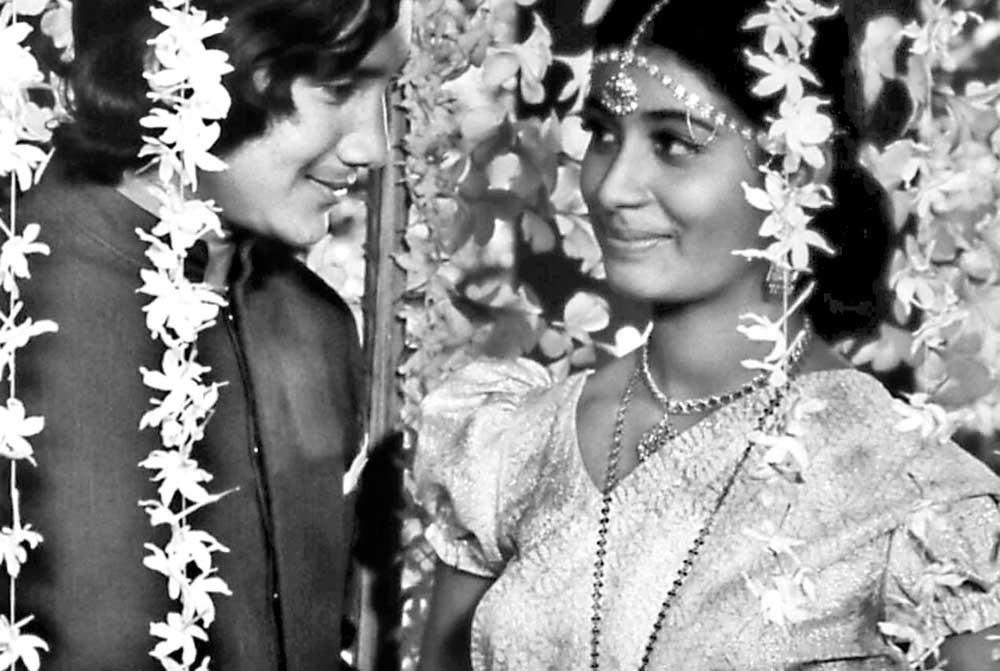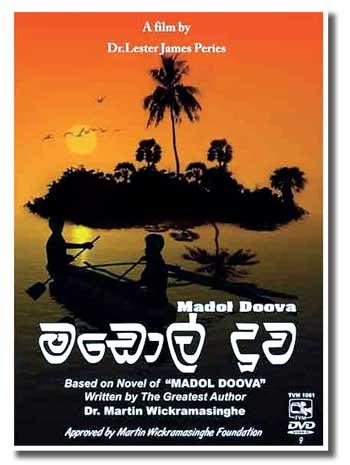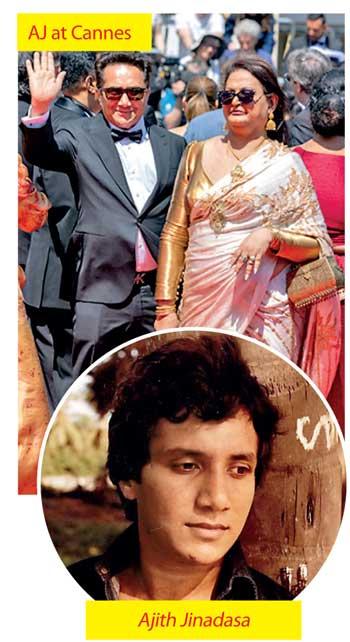
Ajith and Vasanthi in Gehenu Lamai

 From rural beginnings to the red carpet at Cannes – a gentle and quietly luminous film star talks about the highlights of his career and the realities of life.It all began with a letter he wrote to Sri Lanka’s most famous film director expressing his interest to play the lead role in the film ‘Madol Duwa.’ From a very young age he was as avid reader who was particularly obsessed by the books of Martin Wickremesinghe which were central to his education at the Ratnapura Central school which he attended. Literature was always close to his heart and reading up and accumulating knowledge about a wide range of subjects from philosophy to the fine arts resulted in him winning a scholarship.
From rural beginnings to the red carpet at Cannes – a gentle and quietly luminous film star talks about the highlights of his career and the realities of life.It all began with a letter he wrote to Sri Lanka’s most famous film director expressing his interest to play the lead role in the film ‘Madol Duwa.’ From a very young age he was as avid reader who was particularly obsessed by the books of Martin Wickremesinghe which were central to his education at the Ratnapura Central school which he attended. Literature was always close to his heart and reading up and accumulating knowledge about a wide range of subjects from philosophy to the fine arts resulted in him winning a scholarship.
In the late 1960’s and early 1970’s these rare scholarships were awarded to a handful of outstanding students from provincial schools giving them a stepping stone and a helping hand to access a wider curriculum that was available only in the larger schools within our capital city.
As a twelve-year-old, he entered Ananda College to resume his studies while living in the school hostel. This transformative move from the simple life in a village where electricity was a luxury and access to running water was not the norm, to the bright lights and competitiveness of the city was stark and sudden. The scholarship he has won exposed him to the extensive opportunities available in advanced education and professional careers. He did his best to adapt and fit in.
 Much like many of us, he remembers that writing official letters was something that all students were meticulously taught in post-colonial Sri Lanka. And this became an exercise that was essential to pass examinations both in written Sinhalese and in English too. Reading newspapers was always encouraged by teachers as this was one of the few methods of finding out about what was happening in the wider world. Whilst browsing through the Sinhala newspapers, as all the students in the hostel did as part of their daily routine, he came across an advertisement searching for a young boy to play the lead in a film adaptation of ‘Madol Duwa.’ He ceased this opportunity to draft a letter that would change his life forever.
Much like many of us, he remembers that writing official letters was something that all students were meticulously taught in post-colonial Sri Lanka. And this became an exercise that was essential to pass examinations both in written Sinhalese and in English too. Reading newspapers was always encouraged by teachers as this was one of the few methods of finding out about what was happening in the wider world. Whilst browsing through the Sinhala newspapers, as all the students in the hostel did as part of their daily routine, he came across an advertisement searching for a young boy to play the lead in a film adaptation of ‘Madol Duwa.’ He ceased this opportunity to draft a letter that would change his life forever.
Over five thousand letters written by potential hopefuls reached the production team that worked for Lester James Peiris’s film company. A shortlist of about three thousand candidates was put forward for personal one-to-one interviews by this team. Their task was to identify and select a suitable boy for the leading role. After seven arduous auditions, a fourteen-year-old Ajith Jinadasa was selected to play the part of Upali in this iconic film and what followed has become part of Sri Lanka’s cinematic history.
Soon after being catapulted into the limelight Ajith was selected yet again to star opposite another newcomer to the silver screen - Vasanthi Chaturani. The film they appeared together in was ‘Gehenu Lamai ’which was Sumithra Peiris’s directorial debut.
When I asked Ajith how he managed to cope with fame at such a tender age, he immediately cited the support and guidance he received from both Lester and Sumithra Peiris. He also spoke very highly and fondly of the then principle of Ananda College Colonel G W Rajapakse who made every effort to encourage him along the path he had chosen by facilitating and managing the interviews, photoshoots and all the publicity he was receiving whilst managing his studies. All of this took place under the watchful eye of this principle and his staff. Understandably, these safeguarding processes were put in place to protect a teenager who was entering a public sphere which tends to attract unwarranted attention and exposure.
Films gradually became part of Ajith’s life, and he began moving among some of the most notable directors and actors of that time. He starred opposite Gamini Fonseka in ‘Seetha Devi’ which was directed by Manik Sandrasagara, he also played opposite Vijaya Kumaratunge in several films including ‘Ahasin Polowata’ and Jaya Sikurui.’
 Although most actors find their feet by attending drama school and playing various roles in theatre productions prior to venturing into the world of films, Ajith’s journey was in the opposite trajectory. He gradually started moving with actors of the second tier – namely those whose work was primarily in Sinhala theatre and stage productions. These wonderful yet underrated actors were often eclipsed by those who appear on the silver screen for obvious reasons, yet their talents were second to none.
Although most actors find their feet by attending drama school and playing various roles in theatre productions prior to venturing into the world of films, Ajith’s journey was in the opposite trajectory. He gradually started moving with actors of the second tier – namely those whose work was primarily in Sinhala theatre and stage productions. These wonderful yet underrated actors were often eclipsed by those who appear on the silver screen for obvious reasons, yet their talents were second to none.
During this specific time, an associate and friend of Ajith’s and mine called Nimal Ekanayake functioned as an agent of change. He was instrumental in setting up the ‘Eighties Group.’ This group which had taken its ethos from the pioneering ‘Forty-Three Group’ of Sri Lanka, consisted of actors, singers, scriptwriters, comedians, technicians, and others who were specifically interested in contributing to the advancement of Sinhala theatre. Nimal’s association with some of the best-known film stars coupled with his close connections with actors whose names were not often up in lights was crucial in uniting artists from both stage and screen. It was his friendship with the veteran screen actor Tony Ranasinghe that nudged Ajith Jinadasa to take his first steps towards treading the boards.
Tony Ranasinghe had a passion for translating the works of Shakespeare to Sinhalese with the specific aim of presenting these plays for the benefit of those who spoke only in Sinhala. He was responsible for casting Ajith in ‘Dolosveni Raathriya’ – a translation of Shakespeare’s Twelfth Night. This play provided the bridge that Ajith needed to move from the screen to the stage. Not only did this venture provided Ajith with the experience of performing in front of a live audience, but it also gave him a taste of further avenues to explore as a young actor.
This gradual transition from screen to stage gave Ajith a unique opportunity to move with the crème de la crème of the Sinhala theatre. He began collaborating with such luminaries as Jayalath Manoratne, Neil Alles, Jayashri Chandrajith, H A Perera and several others in many notable plays. Among these popular and well received productions were ‘Putra Samagama’ a version of Alexander Vampilov’s ‘The Elder son’ which was translated and directed by Prassana Vithanage, ‘Sihina Saapuwa’ an original play written and directed by Kapila Kumara Kalinga, K B Herath’s original play ‘Maya Devi’ which was directed by Jayalath Manoratne, ‘Avi’ a translation of George Bernard Shaw’s ‘Arms and the Man’ directed by Neil Alles and Rhinoceros by Eugene Ionesco which was translated and directed by Kapila Kumara Kalinga.
 These were the times when Sinhala theatre productions had unlimited runs attracting packed houses filled with people of all ages who were full of appreciation for great theatre and excellent writing.
These were the times when Sinhala theatre productions had unlimited runs attracting packed houses filled with people of all ages who were full of appreciation for great theatre and excellent writing.
After being accepted into the fold of the ‘Eighties Group,’ Ajith’s thirst for knowledge in relation to all things connected to the stage and screen increased. Much like the rest of the group he was also very politically motivated.
This group were always great admirers of what was occurring in the English theatre at that time and used to watch every production that took place at the Lionel Wendt with great interest and respect. Sadly, many of those involved in the English theatre did not reciprocate similarly.
In 1977 the coalition government formed by the SLFP and the LSSP was replaced by the UNP, and the younger generation of Sri Lankans were suddenly exposed to a plethora of western films that had been unavailable to them in the preceding years. After seeing films such as ‘All That Jazz,’ ‘Fame,’ and ‘Hair’ several young actors from the Sinhala theatre developed an interest in movement and dance. Inspired by the novelty of western musical theatre Ajith and some of his friends including Prassana Vithanage started following my classes. Whenever they found the time, they attended dance classes which I held at the Tower Hall Foundation, the Sports Ministry and at my home in Nugegoda. Long lasting friendships were formed during this period, and I began moving with those in the Eighties Group. My involvement with them led me to choreograph movement sequences for several of their productions.
The process of personal development and experimentation with other traditions was essential to those in the Sinhala theatre fraternity. As such, active participation in theatrical ventures which were outside their comfort zone was important to them. Despite their established fame, Ajith and his colleagues did not think twice about being dancers in the backrows of Steve de la Zilwa’s production of ‘West Side Story’ for which I did the choreography. Such was their dedication to their craft.
This golden era of theatre in Sri Lanka came to a sudden end with the introduction of television and the opening of Rupavahini. Much like a virus it destroyed the cinema and theatre industries in its wake. The film industry was severely impacted as many of its technicians left for more lucrative and frequent short-term contracts offered by this new industry. The theatre lost its audience who were quick to gather around idiot boxes clamouring for tacky Indian song and dance routines. Creative writing gradually diminished and good scripts that fed the cinema and theatre industries were hard to come by. Sponsors were attracted to the quick fixes and profitability provided by teledramas. This was a death knell for local thespians.
Adding to this, the political climate from that time onwards became unbearable and volatile. Prominent actors were assassinated, disappearances of those who questions authority became frequent. Terrorism by the LTTE and the JVP threatened everyone and anyone and successive governments broke the rule of law quelling the voices of anyone who opposed them.
Celebrities like Ajith who consistently voiced their beliefs about equality, justice and human rights, felt unsafe. They fled their homeland, seeking political asylum far from everything they knew.
Canada became home to this reluctant immigrant who worked in several jobs none of which were related to his love for theatre and acting as survival became paramount.
After many decades away from the spotlight Ajith received a telephone call earlier this year inviting him to attend the Cannes Film festival as a part of the cast of ‘Gehenu Lamai.’ A restored version of this wonderful film made in 1978 was being released to the world and the boy from Ratnapura along with his co-stars walked on the red carpet bringing a great deal of pride to those of us who call ourselves Sri Lankan.
May his star shine ever brighter, and may his quiet brilliance illuminate our lives once more.










